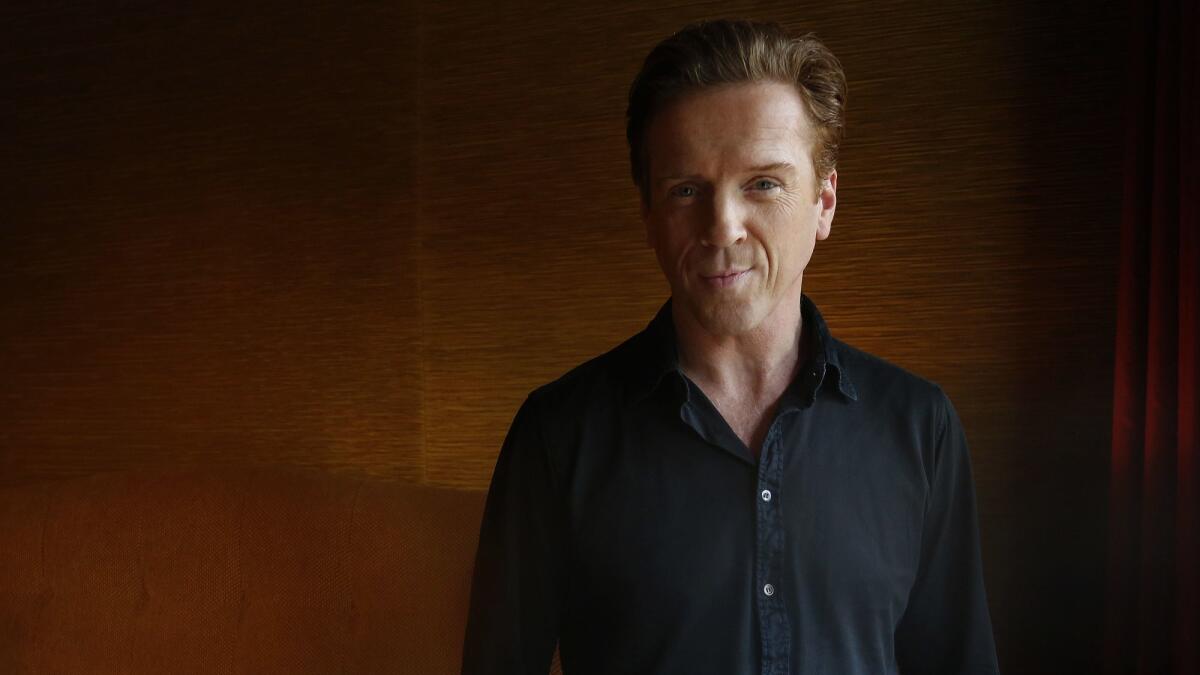IMDb file: Damian Lewis’ path from ‘Band of Brothers’ to ‘Billions’’

“I am interested in the imperfections in people,” Damian Lewis says. “I’m interested in the contradictions and in the moral struggle that often exists in all of us.”
This sensibility threads through many of the actor’s film and television characters, particularly his current role as shrewd hedge fund manager Bobby Axelrod on “Billions.” The Showtime series returns for its third season tonight, bringing us even closer to understanding what exactly makes Bobby tick.
“He’s a fiercely loyal man,” Lewis says about Bobby. “He’s ruthless. He’s extremely competitive. For him, the game is everything. The playing of the game is the thing — and it is a game, so winning the game is paramount. He enjoys it.”
The role is a big shift for Lewis, 47, who got his start on British television before coming to the attention of American audiences in Steven Spielberg’s World War II epic miniseries “Band of Brothers.” Although Lewis has since had several career-defining roles, particularly as Nicholas Brody in “Homeland,” that project lingers as one of his most important projects.
“Some jobs are just gigs, but some jobs have the ability to be life-changing,” he notes. “They just alter you in some small way. ‘Band of Brothers’ was definitely one of those.”
Here Lewis discusses several of his most pivotal roles:
Bobby Axelrod, “Billions” (2016-2018)
“What attracted me to Bobby Axelrod was to get to play a man who is willing to do whatever it takes to get what he wants and see where that takes him personally. To find out, during the course of the show, how corrupting that is on a man who is prepared to cross one line after another. What does it do to one’s soul? I saw that as potentially where it was going. And it’s enormous fun. He’s a form of gangster and it’s fun playing that kind of guy.”
Hector, “Our Kind of Traitor” (2016)
“I thought it was a fantastic script. I love the John Le Carré books and I like the recent adaptations of his books, although he is notoriously hard to adapt because there are so many characters and he’s so interested in the psychological rise of those characters. It’s not just about plot. I thought the balance was beautifully struck here. And Hector is an iconoclast and a rebel within the establishment. He’s not very good at toeing party lines and he has to make some difficult and ruthless decisions in the film. But the humane person in him and the more sensitive human side of him comes out. I enjoyed the contradiction in him.”
Henry VIII, “Wolf Hall” (2015)
“There’s no living record of Henry VIII, so it was just about being as true to [author] Hilary Mantel’s version of him as possible. He was a brilliant yet insecure, boyish man with a short attention span. He was very impressionable and didn’t really enjoy the minutiae of governing. He’s a fascinating character. I was helped enormously by the brilliant costumes, and we borrowed heavily from the Holbein paintings. I used those as my starting point. We had a very specific, particular take on him.”
Nicholas Brody, “Homeland” (2011-2014)
“It gave me an attention that was more aggressive than I’d ever had before. But I don’t know if it changed my career. It was fun and at times daunting to be in an immediate and surprising hit. But was everything offered to me afterwards? Not necessarily, because people felt very uneasy with Brody. The way in which to cast me after that didn’t immediately reveal itself to people. But I thought they did a great job with [his] ending. They had wanted to kill me at the end of season two. And then the show became such a hit and Claire [Danes] and I enjoyed working together so much, and people seemed to enjoy Brody and Carrie together, so they wanted a little bit more of us. I think people were happy with the end of season three. It was, I thought, incredibly moving and memorable.”
Boremont, “Your Highness” (2011)
“We had a lot of fun. Mostly teasing Toby Jones for wearing a suit that made him look like he didn’t have a penis. And him just muttering under his breath, ‘This is a career-ender.’ But charging around on horseback and in full medieval armor was incredible fun. Don’t ask me to ride now, but for a few weeks I was sensational on horseback.”
William Keane, “Keane” (2004)
“It was a bit like guerilla filmmaking. We filmed in the Port Authority without being able to close everything down. We had the budget for about 10 background actors, who would have to walk strategically around the camera through scenes. I hung out at Port Authority for days on end, talking to homeless people — schizophrenic homeless people with second identities. That was the world of Keane. He was a man who was losing his mind and becoming homeless in the grief and distress of having lost his daughter. I found it very moving spending that time with them and talking to them.”
Richard D. Winters, “Band of Brothers” (2001)
“I felt tremendous responsibility. Tom Hanks said, when we were all training in boot camp for the two weeks beforehand, ‘Think of this not really as a piece of drama but as a social document.’ We tried to re-create a truth with such precision that we really felt like we were making a documentary. I’d met Winters and I knew he was this great hero. He was a very still man who let his actions speak louder than his words. I remember saying to Tom and Steven [Spielberg], ‘I think we want to create some kind of arc. He can’t just be absolutely certain of everything he does, unflinching and perfect from the get go.’ I wanted to try and paint a little uncertainty and trepidation in this guy. And then he grew and became the great leader we know. He was a remarkable man.”
More to Read
Only good movies
Get the Indie Focus newsletter, Mark Olsen's weekly guide to the world of cinema.
You may occasionally receive promotional content from the Los Angeles Times.










